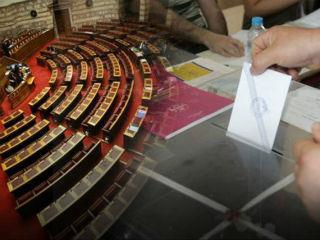The critical answer to the crucial question which all address, that is if self-reliance is possible and under which conditions, is completely unclear because it depends on many conundrums and unknown parameters which will finally determine the winner of the elections.

The polls’ results on January 25 are open to anything since the conditions are so uncertain that may result from self- reliance to a lack of a sustainable government.
by
Fanis
Zouropoulos *
The polls’
results on January 25 are open to anything since the conditions are so
uncertain that may result from self- reliance to a lack of a sustainable
government...
Everything depends on the philosophy of the notorious current
electoral law by the former Minister of Internal Affairs Mr. Prokopis Pavlopoulos,
increasing the bonus of the seats for the first elected party from 40 to 50 and
splitting the remaining 250 proportionally to parties which will pass 3% and therefore
be able to enter the Parliament’s gate.
The critical answer to the crucial
question which all address, that is if self-reliance is possible and under which
conditions, is completely unclear because it depends on many conundrums and
unknown parameters which will finally determine the winner of the elections.
We
will however try to give an answer as to whether we will have a self-reliant
government on the evening of January 25th.
These elections are for
everyone (even the Pollsters) the more uncertain in recent years: The first
and certain issue is that self-reliance does not depend on the percentages of the
first two parties (there is no uncertainty that these will be SYRIZA and ND),
but on the parties that will remain outside the Parliament and on the
cumulative percentage which will be gathered by them.
Theoretically, the
minimum percentage for the first party to acquire self-reliance is 40.4% with
the theoretical -always- provision that the parties which will be excluded from
Parliament will have 0% (!), something which of course does not apply.
From there
onwards, the mysteries and the wiles of the electoral law will begin.
Namely: For every
1% that the off-Parliament parties will acquire the required rate of
self-reliance will be reduced by 0.4%.
Thus, with, for example 1% cumulative
percentage of the excluded from Parliament parties, the bar of self-reliance goes
down from 40.4% to 40% and so on.
The calculation
is as follows: If the cumulative rate of the excluded from Parliament parties is
10%, then multiplied by 0.4% equals 4%.
This is deducted from the minimum rate of
self-reliance (40.4%) and the bar goes down to 36.4%.
For example, at the
elections of May 2012 the rate gathered by the excluded from Parliament parties,
which was exceeding 9%, the bar of self-reliance was moving at 36.8% (ND had
18.85% and SYRIZA 16.79%), while one month later, in June 2012, the corresponding
proportion of the excluded from Parliament parties declined to 6%, raising the
bar of self-reliance to 38% (ND got 29.66% and SYRIZA 26,89%).
The key
therefore of the developments is clearly the cumulative percentage of those parties
which will not catch the ceiling of 3%.
Thus, if for example, the off-Parliament
parties bring together 5%, the bar of self-reliance of the first party will
move to 38.4%, 6% to 38%, 7% to 37.6%, 8% to 37.2% at 9 in 36.8% and 10% at
36.4% ...
From here onwards,
any assessment and scenario adopted can be the actual outcome...
Based on
existing successive polls, the predominance of SYRIZA is "locked",
but self-reliance is not at all easy. A serious poll released some hours ago,
appears as one possible scenario a six-party Parliament (SYRIZA, ND, The POTAMI,
KKE, Golden Dawn and PASOK) with the off-Parliament parties (ANEL, KIDHSO and the
rest) to be at a range of 10-12% which means that the bar of self-reliance will
range from 36.4 to 35.6% (the same measurement gave SYRIZA 28.5% and 25.3% at
ND).
Two imponderables
factors, according to experienced analysts, will affect the election outcome
and also whether the winner will have self-reliance:The first
is "Golden Dawn", which no poll gives the percentage which was
achieved at the 2012 elections (6.9%), so it appears as it will not be the
third party to receive the exploratory mandate.
However, some researchers assume
that this is the case because its followers refuse to declare their preferences
at the research polls and Golden Dawn will result as a third party.
The second
imponderable factor is the newly established party of George Papandreou, which
until now receives some notable rates only in the regions of Achaia and Crete,
while in other areas it is not at allstatistically identified, making it
difficult for the Pollsters to forecast.
If the percentage ends at around 3% (as it currently
moves) this will be proved a determinant factor for the self-reliance. On the
evening of January 25th all scenarios are possible regarding the
outcome of the elections.
The results will determine whether we will have right
away a self-reliant or a coalition government or repletion of elections in one
month after the formation of the Parliament.
Whichever the outcome, the
Parliament which will occur will be the one to elect for the first time -
without a self-reliant government, but with a relative majority - the President
of the Hellenic Republic!
* Fanis Zouropoulos is ex Chairman of E.I.E.T.
and executive president of the Association of European Journalists (EEDE)




 By: N. Peter Kramer
By: N. Peter Kramer
